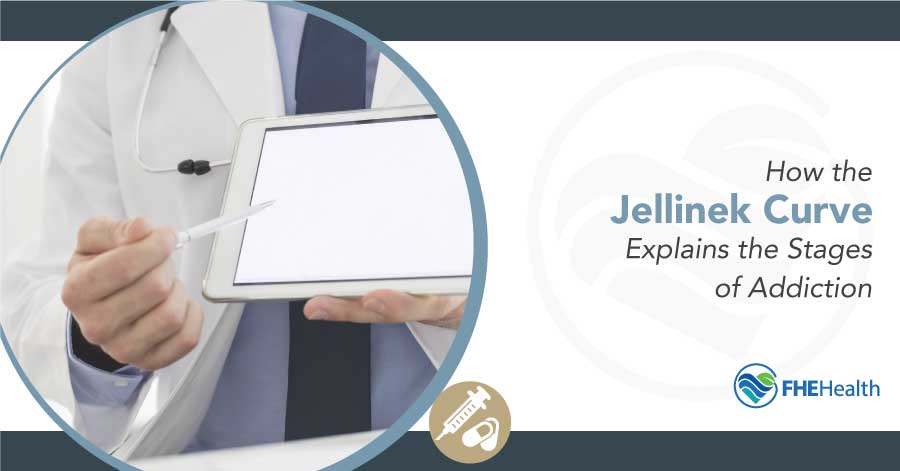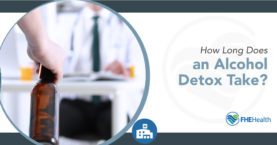
What is the Jellinek Curve?
Whether you’ve experienced alcoholism yourself or had to watch a loved one sink farther and farther into addiction, you’ve probably seen firsthand what the progression of alcohol addiction is. The Jellinek curve puts much of what you’ve observed into an easier-to-see format that shows how a person goes from normal drinking, starts to slide down into addiction, spirals and then — with the right support and tools — begins the journey upward through recovery and eventually levels out again at a sober, healthy lifestyle.
The Jellinek curve offers a great deal of insight into how addiction works and what it looks like, but it’s important to remember that it’s just a model. This means that it’s not a hard-and-fast rule or an absolutely linear progression. In particular, you may skip certain parts of the addiction decline or have a few repetitions if relapse occurs. It should be seen more of a general guideline that helps us understand the cycle of addiction, and it can also be helpful in allowing those with active addiction or trying to recover to see more accurately where they are in the cycle.
Why Was the Jellinek Curve Created?
The Jellinek curve was created by E. M. Jellinek. Jellinek was a very important person helping change the way we understand addiction and recovery, and his research eventually led him to his creation. Jellinek’s original model only covered the slope down from “normal” life to addiction, and it was Dr. Max M. Glatt who added the slope up through recovery and rehabilitation later on. This makes the current Jellinek curve as we know it almost like an inverted bell curve with a cyclical middle that is representative of the throes of addiction itself.
While it has been very important in helping health care professionals, addicts and the friends and family of those struggling better understand the phases of alcohol addiction, it’s not a perfect model. Addiction specialists today use it as a guiding tool to help people understand how substance abuse spirals out of control, common addictive behaviors and the point of recognition that begins the first step toward the sobriety journey.
What Does the Jellinek Curve Posit?
The full Jellinek curve has three basic stages: the crucial phase, the chronic phase and the rehabilitation phase. Understanding what happens in each of these stages can give you a better picture of addiction and help you identify where you or a loved one may be in the cycle.
What is the Crucial Phase?
The crucial phase is the initial stage of addiction where the person is going from occasional drinking that is not a problem to using alcohol to cope with life in an unhealthy manner. In this stage, the person starts drinking more, often increasing both the amount of alcohol and frequency of drinking. At this point the person may experience:
- Increased alcohol tolerance
- Drinking in the morning or earlier in the day than is usually socially acceptable
- Loss of control or willpower when it comes to alcohol
- Blackouts
- Feelings of shame or guilt about drinking behaviors
- Neglect of other areas of life, including career, hygiene and basic nutrition
- Ongoing problems with family relationships
What is the Chronic Phase?
The chronic phase is the bottom of the Jellinek curve, which is appropriate because it represents the addict hitting rock bottom. Things that happen in the chronic phase include:
- Obsession with drinking
- Drinking with other chronic users
- Feelings of recognizing that there is an issue and wanting to get help
- Ongoing cycles of wanting to stop drinking followed by binge drinking
The chronic phase can last quite a while, and it can take multiple attempts to get help before the person truly starts to move toward the upper curve.
What is the Rehabilitation Phase?
The rehabilitation phase of the Jellinek curve begins with an honest desire for help and the addict understanding that addiction is an illness. This starts the road upward through recovery and rehabilitation and back toward a healthy, sober life. Some hallmarks of progression through this stage include:
- Feelings of hope
- Meeting and interacting with former addicts who are living sober lives
- Taking advantage of group and individual therapy
- Reprioritizing basic needs like nutrition, rest and exercise
- Increasing stress tolerance
- Return of confidence of employers
- Reestablishment of personal relationships
It’s important to note that although the Jellinek curve model has rehabilitation as a steady slope upwards, it’s not usually this linear. It’s normal for there to be setbacks and relapses or for a person to need to spend more time focusing on a specific part of the recovery journey than another person does.
Again, it can be extremely helpful and has changed our overall understanding of what addiction is, how it is motivated and what it looks like, but it’s not a rigid example of everyone’s experience with addiction.
What Can We Learn From the Jellinek Curve Model?
One of the biggest things we can learn from the model is that addiction is an illness, and stopping drinking isn’t as simple as “just quitting.” It shows us how addiction can grow from seemingly harmless behaviors and may spiral out of control before the person really fully understands what’s happening.
it also gives us valuable insight into the chronic phase of addiction, in which addicts want to get help but are unable to get out of the cycle. Many people don’t understand why wanting to get help isn’t enough and that it may take several times before an addict can truly step out of that spin cycle and head into recovery.
And while the Jellinek curve is a great tool to show addicts and their friends and family how the behaviors and feelings they may be seeing or experiencing are normal for that stage of addiction, it also shows us that not everyone’s journey is the same.
No matter where you think you may fall on the curve, there is help available. Contact FHE Health today to talk to a member of our trained staff who can help you better understand the range of programs we offer and what might be most suitable for your situation. A better life is possible, and there is hope to be found if you’re ready to take that first step.









